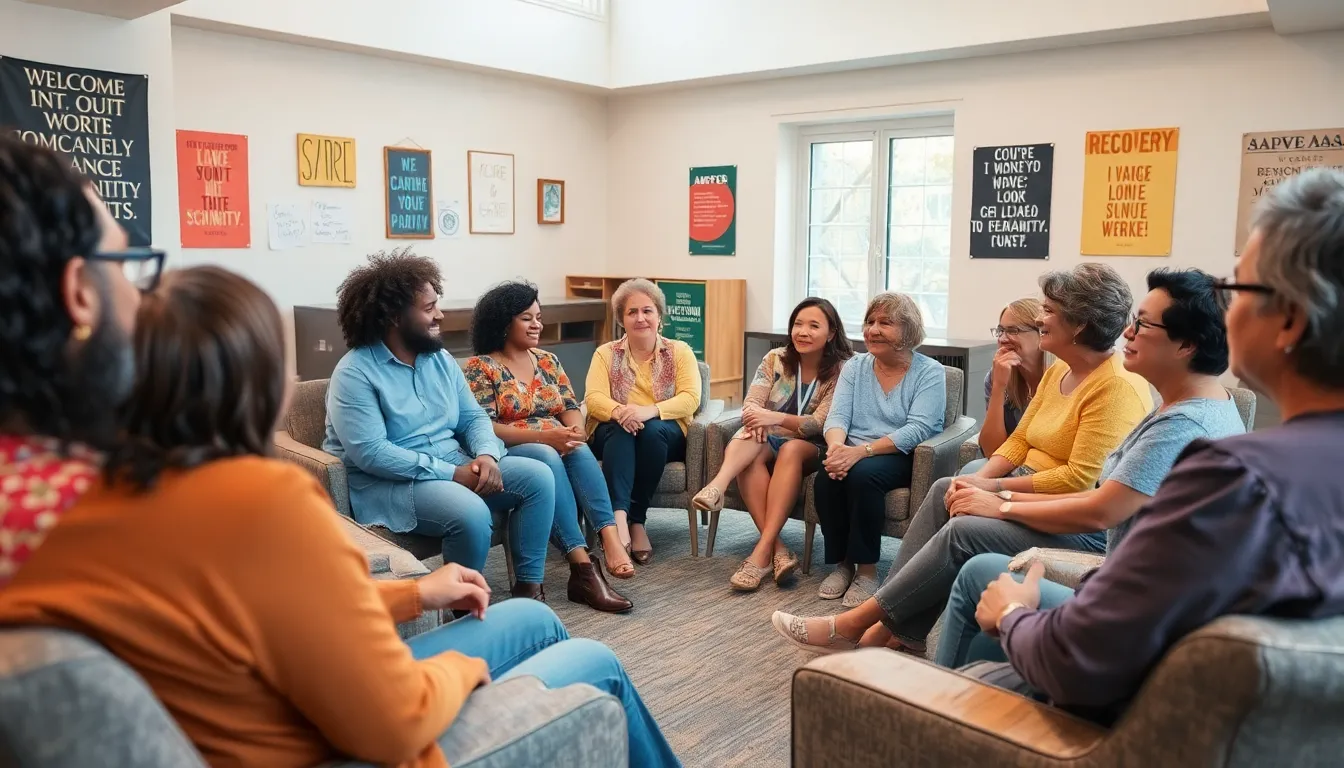After-care programs might sound like a fancy spa treatment for your mental health, but they’re so much more than that. Think of them as the safety net that catches you when life decides to throw you a curveball. These programs provide essential support after treatment, helping individuals transition smoothly back into everyday life.
Imagine navigating the wild world of adulthood without a map—confusing, right? After-care programs offer that much-needed guidance, ensuring no one has to go it alone. They equip individuals with tools and resources to maintain their progress, tackle challenges, and even find joy in the journey. So, whether it’s a weekly check-in or a community support group, after-care programs are here to help everyone thrive, one laugh at a time.
Table of Contents
ToggleOverview of After-Care Programs
After-care programs serve a vital role in supporting individuals as they transition from treatment to everyday life. These programs are not only beneficial but often crucial for maintaining the progress achieved during recovery. They act as a safety net, providing essential guidance and resources to navigate potential challenges.
Weekly check-ins form a core component of many after-care programs. Participants can discuss their experiences and address any difficulties in a supportive environment. Community groups also play a significant part, offering a sense of belonging and shared understanding among individuals facing similar journeys.
Support services often include access to mental health professionals, life skills training, and educational workshops. Such resources empower individuals, equipping them with tools for long-term success. Personalized care plans ensure that each participant receives support tailored to their unique needs.
Success stories frequently emerge from effective after-care programs. Individuals often report improved emotional well-being and greater resilience when facing life’s challenges. Accessing these programs can also lead to the establishment of positive routines, helping individuals reintegrate successfully into their communities.
Overall, after-care programs focus on holistic development and sustained growth. They aim to instill confidence and foster joy in life beyond recovery. Through comprehensive support, these programs ensure that individuals thrive and continue their journey toward a fulfilling life.
Importance of After-Care Programs

After-care programs play a vital role in aiding individuals’ transitions back to daily life after treatment. These programs serve as essential support systems that provide necessary resources and guidance.
Supporting Recovery
Supporting recovery involves offering individuals ongoing emotional and practical assistance. Weekly check-ins create opportunities for open dialogue, allowing participants to express their feelings in a safe environment. This shared experience fosters connections among peers who understand similar struggles. Access to mental health professionals strengthens coping strategies, addressing underlying issues that may arise during the recovery process. Life skills training equips individuals with practical tools, enhancing their ability to handle daily challenges. Educational workshops provide further knowledge and resources, promoting self-improvement. Together, these components reinforce the importance of a comprehensive support network.
Reducing Recidivism
Reducing recidivism significantly benefits from structured after-care programs. These programs offer continuity of care that helps individuals maintain the progress achieved during treatment. Engaging in community groups allows individuals to build lasting friendships, reducing feelings of isolation. Connections with mentors create accountability and guidance, further preventing relapse. Studies indicate that individuals participating in after-care programs experience lower rates of recurrence in unsafe behaviors. Tailored care plans ensure that support is specific to each individual’s needs, enhancing overall effectiveness. By addressing potential triggers proactively, after-care programs contribute to lasting change and long-term stability.
Types of After-Care Programs
After-care programs encompass various types of support tailored to specific needs, ensuring individuals receive targeted assistance during their transition.
Substance Abuse After-Care
Substance abuse after-care programs focus on maintaining sobriety. These programs include group therapy sessions where participants share experiences and coping strategies. Individual counseling offers personalized support, addressing unique challenges faced by each person. Regular drug screenings may be employed to encourage accountability while reinforcing commitment to recovery. Many programs incorporate 12-step meetings, fostering community and ongoing support. By engaging in continued education about addiction, individuals build resilience against potential triggers.
Mental Health After-Care
Mental health after-care programs prioritize ongoing emotional support and stability. Participants benefit from one-on-one therapy, which targets specific mental health disorders and encourages personal growth. Support groups provide a platform for shared experiences, reducing feelings of isolation and encouraging connection. Regular mindfulness or coping skill workshops enhance resilience during challenging times. Accessibility to crisis intervention services ensures that help is available when needed. This multifaceted approach nurtures mental well-being and fosters a healthier mindset.
Educational and Vocational Support
Educational and vocational support programs play a vital role in personal development. These programs offer job placement services helping individuals secure employment aligned with their skills and interests. Workshops on resume building and interview techniques empower participants in the job search process. Additionally, access to educational resources allows for continuous learning and skill acquisition. Collaborations with local businesses often create internship opportunities, providing hands-on experience. Ultimately, these programs promote independence and self-sufficiency, contributing to long-term success.
Best Practices for After-Care Programs
Effective after-care programs prioritize tailored approaches that meet individual needs. Individualized planning forms the cornerstone of successful transitions. Programs create personalized care plans that identify specific goals and preferred strategies for each participant. Assessments help to determine strengths, challenges, and triggers, ensuring that care aligns with personal circumstances. Facilitators regularly update these plans to adapt to progress or setbacks, keeping participants engaged in their recovery.
Community involvement enhances the effectiveness of after-care programs. Engaging individuals with local resources, such as support groups and volunteer opportunities, fosters a sense of belonging. Participants who connect with their community can build meaningful relationships that provide support and accountability. Inclusive events, such as group outings and workshops, promote socialization while reinforcing recovery objectives. Programs that encourage peer involvement often enjoy higher rates of retention, illustrating the importance of community connections in sustaining long-term success.
Challenges in Implementing After-Care Programs
Implementing after-care programs presents various challenges that can impact their effectiveness. Addressing these challenges is crucial for improving support and resources.
Funding and Resources
Funding remains one of the most significant challenges after-care programs face. Many organizations rely on grants and donations, which can fluctuate. Insufficient funding limits the ability to hire qualified staff and offer diverse services. Programs need stable financial backing to sustain essential features like weekly check-ins and workshops. Grants must align well with community needs to maximize impact. Resource allocation requires careful planning to ensure all aspects receive adequate support. Increased government and private investment can bolster program sustainability and accessibility. Collaborative efforts with local businesses can also provide valuable resources.
Stigma and Acceptance
Stigma surrounding mental health and addiction can hinder the success of after-care programs. Individuals may feel embarrassed or reluctant to seek help due to societal perceptions. Acceptance plays a crucial role in building a supportive environment for participants. Challenging negative stereotypes through community outreach can promote understanding and willingness to engage. Educating the public about the significance of these programs encourages more individuals to participate. Ultimately, creating an inclusive atmosphere enhances overall program effectiveness, ensuring individuals feel valued in their recovery journey.
After-care programs play a pivotal role in supporting individuals as they transition back into everyday life. By providing tailored resources and fostering community connections, these programs enhance the chances of sustained recovery and personal growth. The combination of emotional support and practical skills equips participants to navigate challenges effectively.
Addressing funding and stigma remains crucial for the continued success of after-care initiatives. With stable support and a commitment to promoting acceptance, these programs can thrive and significantly impact individuals’ lives. Ultimately, after-care programs are essential for fostering resilience and ensuring that individuals not only survive but thrive in their recovery journeys.




